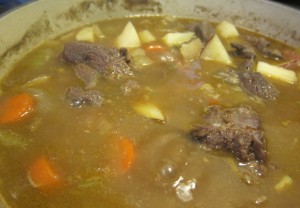From the Book of Exodus:
When Pharaoh let the people go, God did not lead them by way of the land of the Philistines, although that was nearer; for God thought, “If the people face war, they may change their minds and return to Egypt.” So God led the people by the roundabout way of the wilderness towards the Red Sea.
(From the Daily Office Lectionary – Exod. 13:17-18a (NRSV) – April 26, 2014.)
 “Better the devil you know than the devil you don’t know,” was something my grandmother often said. Apparently she took after the ancient Israelites . . . but then don’t most people. We would rather stay in (or return to) a bad situation than face a possibly worse predicament. God know these people well — not too much farther down the road they will complain about their hunger and long for the pots of stew they enjoyed as slaves:
“Better the devil you know than the devil you don’t know,” was something my grandmother often said. Apparently she took after the ancient Israelites . . . but then don’t most people. We would rather stay in (or return to) a bad situation than face a possibly worse predicament. God know these people well — not too much farther down the road they will complain about their hunger and long for the pots of stew they enjoyed as slaves:
The whole congregation of the Israelites complained against Moses and Aaron in the wilderness. The Israelites said to them, “If only we had died by the hand of the Lord in the land of Egypt, when we sat by the fleshpots and ate our fill of bread; for you have brought us out into this wilderness to kill this whole assembly with hunger.” (Exod 16:2-3)
Facing a bit of privation, they were ready to turn back; they would surely have done so if they faced war.
My problem with bible stories like this is . . . I don’t believe them. Oh, I believe the Hebrews left Egypt and took a long time to get where they were going. I just don’t believe that God micro-managed their trek like some cosmic travel agent, planning their route to avoid trouble (or, at least, warfare) along the way. I’m sure they believed God was doing so, but I don’t.
Stories like this, taken at face value, lead to a kind of God-has-a-plan-for-me personal spirituality that I find both incredible and off-putting. Not too long ago, I was watching an episode of Chopped on the Food Channel — I really like that show, by the way! — and one of the contestants was a “born-again Christian.” In each and every one of his short interview segments, his refrain was, “God did this for me” and “God planned for me to become a chef” and “God brought me here to win” and on and on and on.
As a witness for the Christian faith it was (at least to me) having an opposite effect. I had two thoughts. First, I wanted to get in his face and tell him to take personal responsibility (both positive and negative) for the events of his life and the decisions that had led him to where he was! God may have given him the talent, the skills, the strength, and the wisdom to get to that point in life, but God hadn’t made every little decision, God hadn’t road-mapped his existence for him.
And second . . . I started cheering for his opponents. I didn’t want the Christian guy to win! I dreaded seeing some sort of born-again Christian end-zone victory dance, a Tim Tiebow single-knee, fist-to-the-bowed-forehead genuflection in the middle of Chopped kitchen.
Sure enough, after the entree round, he was chopped. On the walk of shame down the back hallway of the studio, his comment was (predictably), “God brought me here . . . .” So now is God responsible for him losing? Is God to blame because he didn’t have enough onion in his fleshpot? Was it God who didn’t transform the basket ingredients sufficiently to impress the Chopped judges?
I don’t doubt for a minute that God was with the Hebrews in the desert. I don’t doubt for a minute that God was with the Chopped contestant. I don’t doubt for a minute that God is with me in the trials, tribulations, victories, and happy moments of my own life.
But I just don’t believe that God is a micro-managing travel agent planning every step any of us take. I just don’t. “God made me do it,” is no better a theology or personal spirituality than Flip Wilson’s “The devil made me do it.” Both are an abdication of personal responsibility.
If we choose to go the long way around, the choice is ours. If we choose the lean pickings of the desert over the full stewpots of Egypt, the choice is ours. If we choose to become chefs and compete in the Chopped kitchen, the choice is ours. If we choose the devil we know over the devil we don’t know, the choice is ours.
The choice is ours. Not God’s.
====================
A request to my readers: I’m trying to build the readership of this blog and I’d very much appreciate your help in doing so. If you find something here that is of value, please share it with others. If you are on Facebook, “like” the posts on your page so others can see them. If you are following me on Twitter, please “retweet” the notices of these meditations. If you have a blog of your own, please include mine in your links (a favor I will gladly reciprocate). Many thanks!
====================
Father Funston is the rector of St. Paul’s Episcopal Church, Medina, Ohio.



Leave a Reply